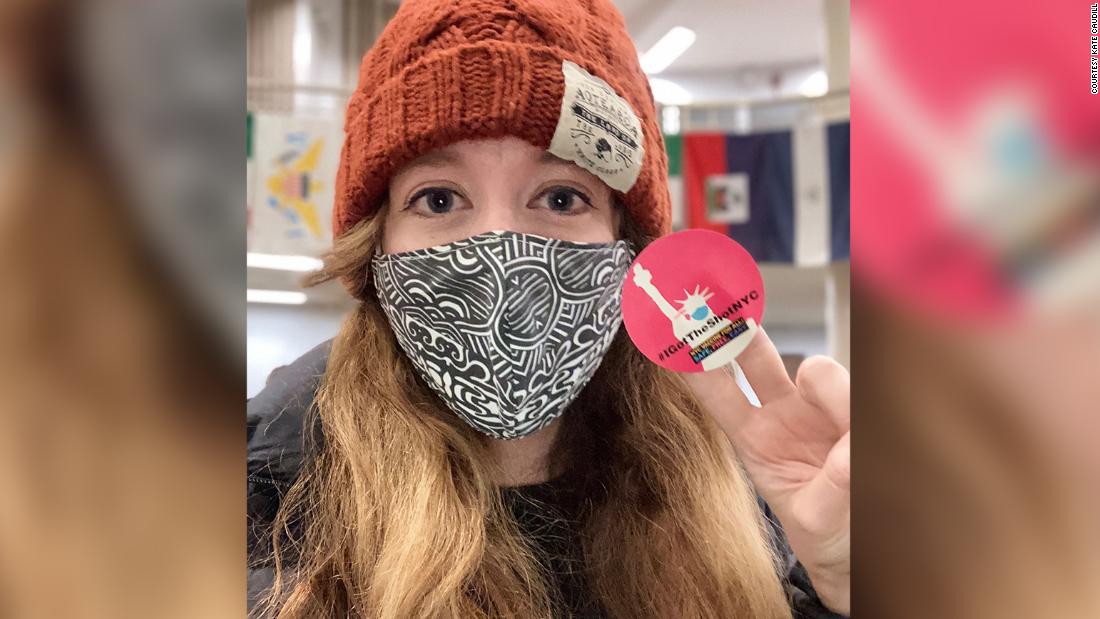As the primary caregiver for his immunocompromised mother, who sewed and donated more than 2,000 masks in the early days of the pandemic, Hall said capturing the moment was an important step in releasing some of the anxiety that affected his mental health last year. “I shared a selfie because it was the first time that I could look to the future in a year,” Hall told CNN Business.
As the vaccine’s launch has expanded to more people across the country, the vaccine’s selfies have spread across social networks and chat apps. Whether taken at the time of the injection, on the drive home or in front of an official banner at a vaccination site, people are celebrating and publicizing that they are doing their part to help stop the virus from spreading.
Some vaccine sites are distributing stickers, much like the ones voters receive in election day polls, as well as setting up selfies booths and encouraging people to share photos online with various hashtags, like #IGotTheShotNYC and #ImABigShot.
As with any selfie, the trend leans towards our desire to share positive moments in our lives, not to mention a certain impulse of self-promotion. But the motivations behind vaccine selfies go far beyond this: it is seen as a way for those who take selfie to signal to their loved ones that they are safe and vaccinated, a dissemination tool to be part of an exclusive group and a potential means for help dispel the vaccine skepticism in others.
For Kate Caudill, who works for the federal government on Covid aid loans and volunteers with the New York medical reserve corps in a vaccination pod, posting a selfie was important “to encourage other people who felt good and confident” after receiving what was left over at the end of a day in January.
Partly with the goal of reducing vaccine hesitation, some vaccine sites are making it easier for people to take and share selfies, creating a scenario similar to what can be seen at a red carpet event. Virtua Health, a New Jersey-based nonprofit health care system that started vaccinating its own workforce in mid-December, was one of the organizations to take this approach.
“From day one, we realized that our frontline employees were eager to document this great moment in their lives, so we created a ‘selfie station’ in the observation area of our clinic,” said Daniel Moise, director of communications and involvement in Virtua Health. “He was instantly popular with most employees stopping to take a picture.”
A month later, Virtua Health became a health care partner for one of New Jersey’s vaccine mega-sites and set up a similar station near the building’s exit. People who get the vaccine can take pictures when they leave and pose with portable posters that say “I have my COVID-19 vaccine!” and “First dose!” The installation requires people to use antibacterial wipes when handling the blades, he added.
“Our hope is that, by posting a photo on social media, guests will encourage their friends and family to follow their example,” said Moise. “We know that there are people who are hesitant to proceed with the vaccination; perhaps seeing these commemorative photos of people they know and trust will reduce their reluctance – or at least open the door for a conversation.”
Although vaccine selfies can be a demonstration of civic action, there is an element of exclusivity as well. “In this case, it also gives a sense of status, as access to the vaccine is limited,” said Karen Kovacs North, professor of digital social media at the Annenberg School at the University of Southern California.
“Many people report feeling jealous or even depressed when they see that other people are getting an injection and don’t even know when they will be eligible,” said Klaiman. “This is exacerbated by the inequality in the way the vaccine is administered. People who don’t have time to look for appointments can be jealous when they see that other people have them ”.
